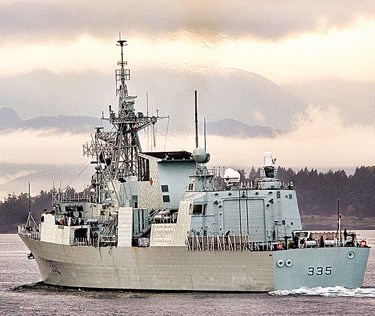The shoreline between Nanaimo and Parksville is being monitored following the discovery of a fuel spill by HMCS Calgary while the ship was underway in the Strait of Georgia early Saturday morning.
The Royal Canadian Navy warship spilled about 30,000 litres of F-76 fuel into the water during a routine transfer on board the vessel. While the navy says it is too early to determine the cause of the spill, an open valve in an overflow tank was the likely cause, and human error has not been ruled out.
“By all accounts, the fuel was leaking out slowly, otherwise it would have triggered an alarm sooner,” said Commodore Buck Zwick, commander of the Pacific Fleet of the Royal Canadian Navy at a press briefing Sunday afternoon. “Once HMCS Calgary became aware of the spill, she reversed course and took all appropriate action to contain the spill.”
An environmental response team has been assembled at CFB Esquimalt for deployment.
Zwick said that the fuel involved has the consistency of kerosene. It floats on the surface of the water and dissipates relatively quickly.
So far, there is no evidence it has affected marine life.
Experts at Environment and Climate Change Canada helped the navy by providing computer modelling, taking into account the current and tides, to estimate the potential shoreline that might be affected. They believe that the spill will have limited impact on the environment. The spill took place while the vessel was about in the middle of the strait.
Nevertheless, the navy, assisted by the Canadian Coast Guard, has conducted air, sea and land-based searches for a slick or evidence of landfall of the fuel. They have found neither in the past 24 hours.
“A full investigation is under way to determine the cause of the spill,” said Zwick. “We will continue to monitor the situation.”
HMCS Calgary is a Halifax-class frigate based at CFB Esquimalt.



